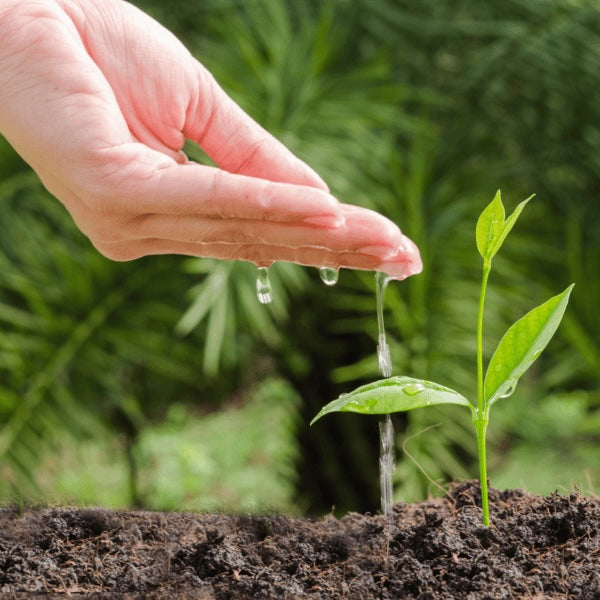
This pack includes 100 tree saplings of native trees of your region. All sapling will come in polybag with height between 2ft to 5ft. Planting native Read more
This pack includes 100 tree saplings of native trees of your region.
All sapling will come in polybag with height between 2ft to 5ft.
Planting native trees provide benefits such as promoting biodiversity, reducing soil erosion, regulating the local climate, providing a sustainable resource, improving air quality, and adding aesthetic value to the environment.
They play a crucial role in maintaining the balance of the ecosystem and supporting the well-being of local communities.
Planting native trees have several benefits for the environment and the local community. Some of the reasons why it's good to plant native trees include:
-
Biodiversity: Native trees provide habitat and food for a variety of native animals, birds, and insects, promoting biodiversity and maintaining the balance of the ecosystem.
-
Soil conservation: Native trees have deep roots that help to hold soil in place, reducing soil erosion and promoting soil health.
-
Climate stability: Native trees play an important role in regulating the local climate, providing shade and cooling in summer, and shelter and warmth in winter.
-
Sustainable resource: Native trees can provide a sustainable source of food, fuel, and materials for local communities, reducing the need for imported resources.
-
Improved air quality: Native trees act as natural air filters, removing pollutants from the air and producing oxygen.
-
Aesthetic value: Native trees add beauty and character to the landscape, and can create a sense of place and identity for local communities.
Tree Plantation Programs
Organized initiatives for planting native tree saplings, fostering biodiversity and sustainability in local ecosystems.
Native Tree Saplings
High-quality saplings in polybags provided by Grow Billion Trees Foundation, contributing to regional ecological balance and supporting native wildlife populations.
Biodiversity Enhancement
Planting native trees creates habitats and food sources, nurturing diverse ecosystems and wildlife populations, crucial for maintaining ecological balance.
Soil Erosion Prevention
Deep-rooted trees stabilize soil, reducing erosion and promoting soil health, essential for sustainable land management practices.
Climate Regulation
Trees regulate local climates by providing shade, cooling effects, and shelter, crucial for moderating temperature extremes and promoting environmental resilience.
Sustainable Resources
Native trees offer renewable resources like food, fuel, and materials, supporting local communities sustainably and reducing reliance on non-renewable sources.
Air Quality Improvement
Trees act as natural air filters, purifying the air by removing pollutants and releasing oxygen, enhancing overall air quality and public health.
Aesthetic Landscape Value
Native trees enhance the visual appeal of landscapes, contributing to community well-being and fostering a sense of place and identity.
Ecosystem Balance
Trees play a vital role in maintaining ecosystem balance by supporting diverse habitats and species, promoting resilience and sustainability in natural environments.
Community Well-being
Tree planting initiatives improve community well-being by enhancing environmental quality, promoting outdoor recreation, and fostering social cohesion.
FAQ
What are the benefits of planting trees?
Planting trees provides various benefits such as improving air quality, enhancing biodiversity, preventing soil erosion, and supporting wildlife habitats, contributing to healthier and more resilient ecosystems.
How do native trees contribute to biodiversity?
Native trees support biodiversity by providing essential habitats and food sources for a diverse range of wildlife species, fostering ecosystem resilience and stability.
Why is soil erosion prevention important?
Soil erosion prevention is crucial for maintaining soil health and fertility, supporting agricultural productivity, and preventing environmental degradation caused by sediment runoff.
What role do trees play in climate regulation?
Trees play a critical role in climate regulation by absorbing carbon dioxide, providing shade and cooling effects, and moderating local temperature extremes, contributing to climate resilience and adaptation.
What sustainable benefits do native trees offer?
Native trees offer sustainable resources such as food, fuel, and materials, supporting local communities while reducing environmental impact and promoting ecosystem health.
How do trees impact air quality?
Trees improve air quality by filtering pollutants, releasing oxygen, and mitigating the effects of urban pollution, contributing to better public health and well-being.
Why is aesthetic landscape value significant?
Aesthetic landscape value enhances community well-being by creating visually appealing environments, fostering a sense of pride and identity, and promoting outdoor enjoyment and recreation.
What is the role of trees in ecosystem balance?
Trees maintain ecosystem balance by providing habitats, regulating water cycles, and supporting nutrient cycling, contributing to the overall health and resilience of natural environments.
How do tree plantation programs benefit community well-being?
Tree plantation programs improve community well-being by enhancing environmental quality, providing recreational opportunities, and fostering social connections and community engagement.

